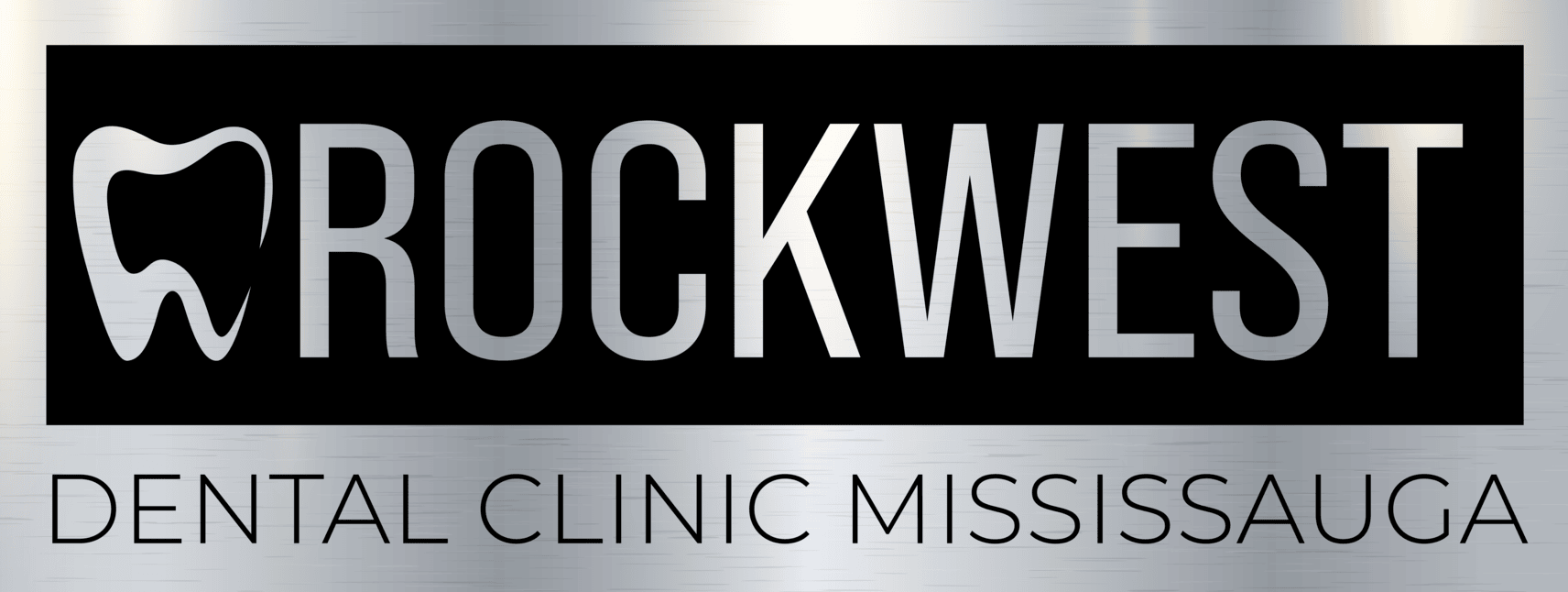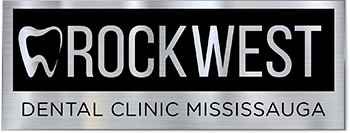Tooth Extractions
In Mississauga
Comfortable, Stress-Free, and Affordable Tooth Extractions
How a Damaged Tooth Affects Your Oral Health
You’ve likely heard the saying, “one bad apple can spoil the bunch,” and the same principle applies to your teeth! A single damaged tooth can significantly impact your oral health, potentially causing jawbone deterioration and gum disease. At Rockwest Dental Clinic, our skilled dentists strive to preserve your teeth through regular cleanings and restorative treatments. However, if the damage is irreparable, a tooth extraction may be necessary to protect your overall oral health.
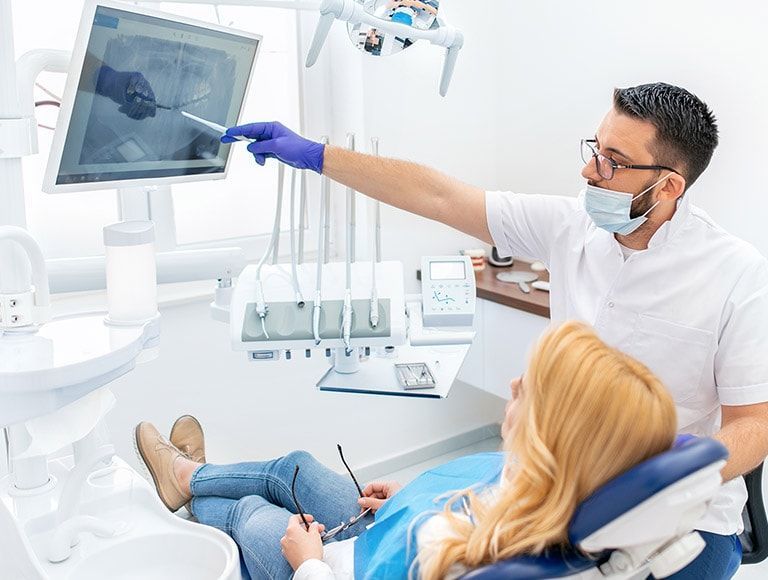
Stress-Free Tooth Extractions for Optimal Oral Health
Tooth extraction might seem daunting, but it’s a quick and straightforward procedure that our experienced dentists in Mississauga have performed countless times. It’s minimally invasive, and with our sedation options, the process is virtually painless. Our caring team will guide you through each step and help you determine if a tooth extraction is the best solution for your oral health.
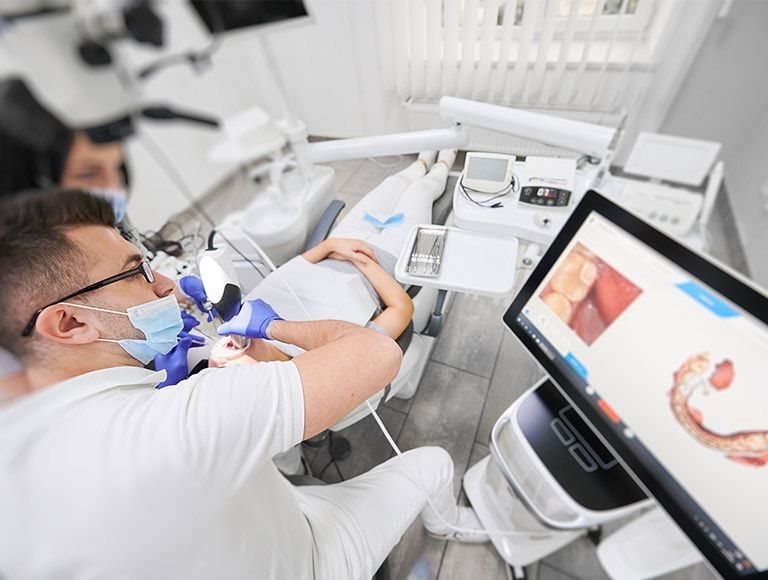
Trusted Tooth Extraction and Replacement Solutions
If you’re searching for the top dentist in Mississauga for tooth extractions, we hope Rockwest Dental Clinic is your choice. While removing a tooth is never ideal, it’s sometimes necessary, and our compassionate team is here to make the process as smooth and stress-free as possible. We’ll also discuss tooth replacement options like bridges to restore your smile, so you can get back to showing off your confident grin in no time!
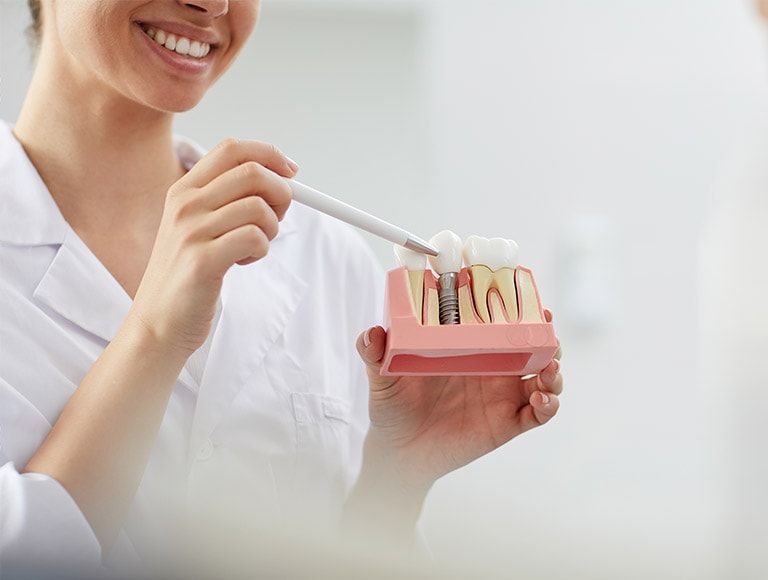
Swollen Gums? Loose Tooth? Extraction Might Be Key
Swollen or discolored gums could be a sign of gum disease. If a tooth becomes loose in such cases, it may need to be extracted to prevent the infection from spreading to surrounding teeth.

Why Removing Your Wisdom Teeth Is a Smart Choice
Feeling anxious about wisdom tooth removal is natural, but rest assured that the benefits far outweigh the drawbacks. Here are some of the key reasons why removing your wisdom teeth is a wise decision:
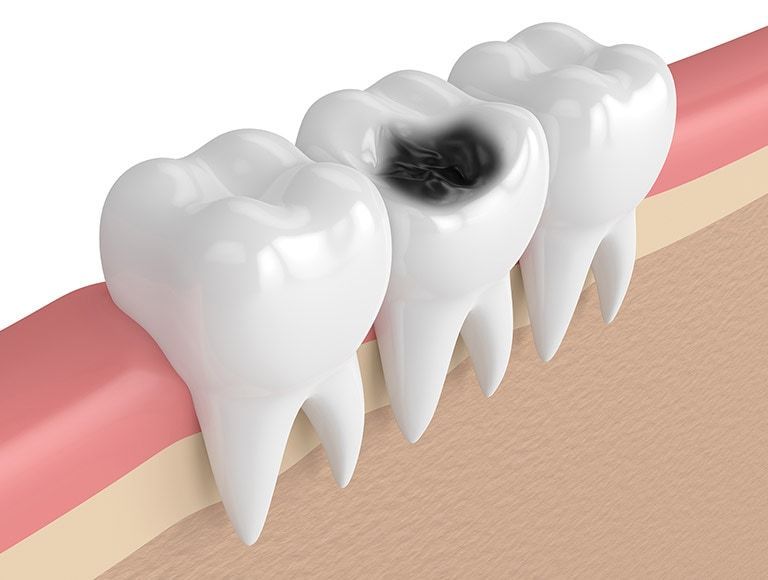
Risk of Infection
If your tooth shows signs of a potential infection, one of our skilled dentists will assess the situation and, if necessary, perform an extraction to prevent more severe and painful complications down the line.
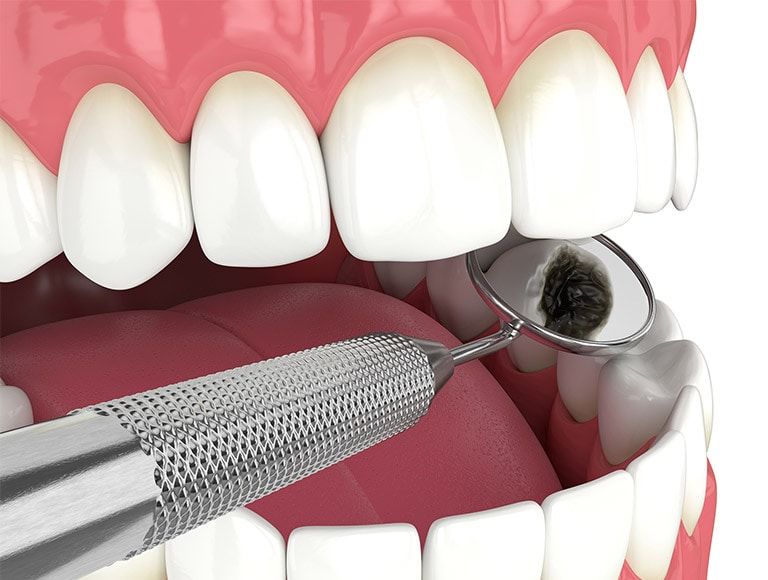
Pulp Infection
The center of a tooth, known as the pulp, houses the blood vessels and nerves. If the pulp becomes decayed, damaged, or infected, extraction may be necessary. In some cases, a root canal can effectively treat pulp infections. The expert team at Rockwest Dental will carefully evaluate your condition and recommend the best treatment option for you.
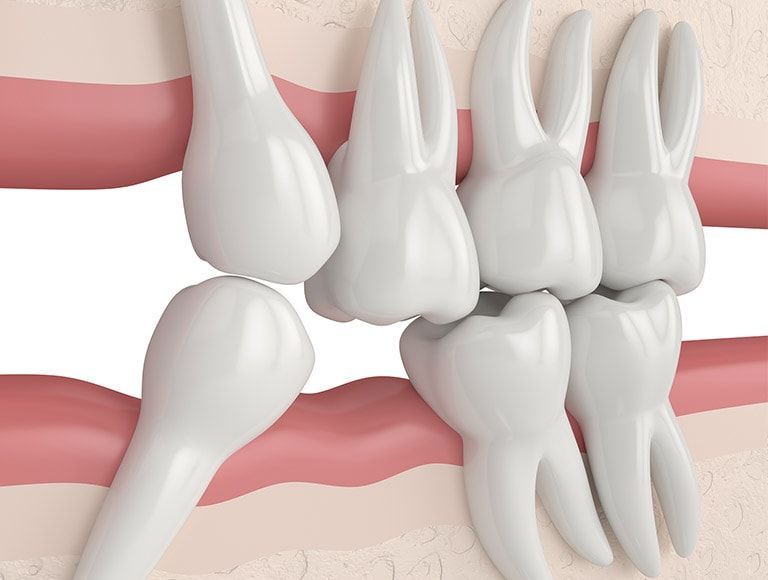
Impacted Tooth/Crowding
In some cases, teeth fail to fully emerge through the gum due to insufficient space in the mouth caused by crowding. To prevent damage to surrounding teeth, the dentist may recommend extracting the affected tooth. This is particularly common with wisdom teeth. At our Mississauga dental clinic, we specialize in wisdom tooth extractions to address such issues effectively.
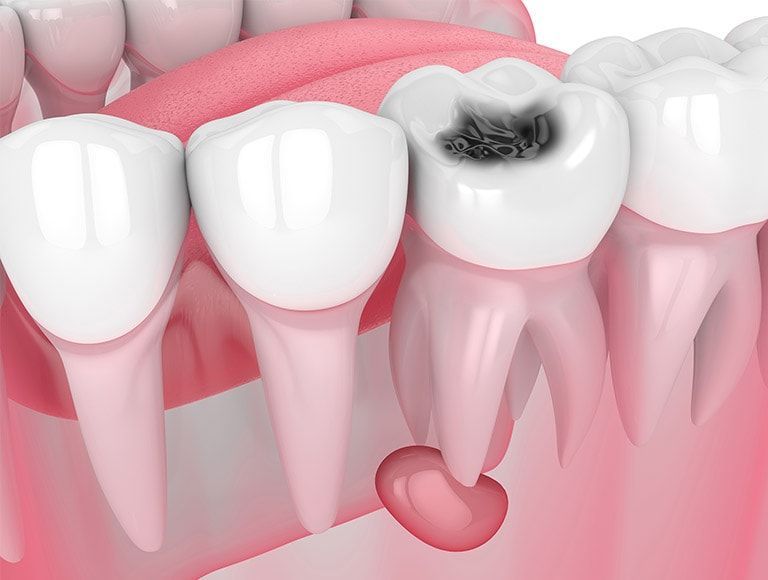
Gum Disease
Swollen or discolored gums can be a sign of gum disease. If a tooth becomes loose under these conditions, extraction may be necessary to prevent the infection from spreading to nearby teeth.
Simple and Efficient Tooth Extractions
The process of tooth extraction is simple and efficient. One of our experienced Mississauga dentists will begin by numbing the area, then carefully loosen and remove the tooth. A blood clot will naturally form in the socket, and a gauze pad will be provided to help control bleeding and reduce the risk of infection. In some cases, stitches may be needed at the extraction site; these will dissolve within a few days. You’ll receive detailed aftercare instructions, and a follow-up appointment will be scheduled if necessary.
Here are the two main types of tooth extraction and how they are performed:
Simple Extraction
The tooth extraction process begins with anesthesia to numb the area. The dentist uses an elevator to loosen the tooth by separating surrounding tissues. Once loosened, the tooth is carefully removed with forceps for a painless experience.
Surgical Extraction
Surgical extractions are performed for hard-to-reach or partially erupted teeth. After administering anesthesia, the surgeon makes a gum incision for access. If needed, the tooth is broken into smaller pieces for easier and precise removal.
What to do after a tooth extraction
After your tooth extraction, the dentist will give you clear recovery instructions to follow. Depending on the complexity of the procedure, they may prescribe painkillers or antibiotics to aid in healing. If you experience swelling, applying a cold compress to your cheek for ten minutes at a time can help reduce it effectively.
Post-Extraction Care: What to Eat After a Tooth Extraction
For the first 24 hours after a tooth extraction, stick to soft foods such as soup, pudding, yogurt, or applesauce. Make sure these foods are neither too hot nor too cold. Gradually reintroduce more solid foods in the days that follow, but take care to avoid chewing on the side of your mouth where the extraction occurred.

Drink Tips to Follow After a Tooth Extraction
During the first 24 hours after your tooth extraction, avoid drinking alcohol or using a straw, as the suction can disrupt healing. Steer clear of hot beverages like coffee and tea, and don’t add ice to your drinks, as extreme temperatures can cause discomfort at the extraction site.

How long does a tooth extraction take to heal
Recovery from a tooth extraction typically takes about one to two weeks. It's important to monitor the extraction site daily to ensure it is healing properly. If you experience severe pain, persistent bleeding, or swelling lasting more than 24 hours after the procedure, contact your dentist immediately.
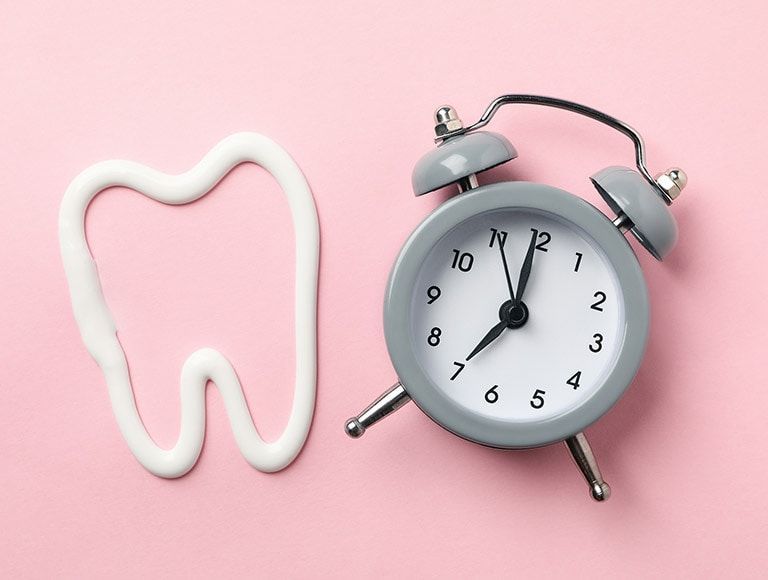
Emergency Tooth Extraction
In some cases, patients may need emergency dental services for a tooth extraction. One common reason is a severely abscessed tooth, which results from a bacterial infection. An abscess is a pocket of pus that often develops due to an untreated cavity or dental injury. If left untreated, it can lead to serious and potentially life-threatening complications, making prompt extraction essential.
Another scenario requiring emergency tooth extraction is a hemorrhage caused by an accident or injury. If a tooth has been partially dislodged and is bleeding uncontrollably from the root, urgent extraction is necessary to manage the bleeding and prevent further complications.
Rockwest Dental Clinic is proud to offer emergency tooth extraction services in Mississauga. If you need urgent dental care, don’t hesitate to contact us right away.
Emergency Tooth Extraction
Sometimes patients require emergency dental services for tooth extraction. A severely abscessed tooth would lead to an emergency tooth extraction. A tooth abscess is caused by a bacterial infection. It is a pocket of pus that typically forms due to an untreated dental cavity or injury. If the abscess is untreated, it can cause complicated and fatal issues.
Another emergency tooth extraction situation is a hemorrhage following an accident or injury. If a tooth has been partially knocked out of place and is uncontrollably bleeding from the tooth root, it will require urgent extraction.
Rockwest Dental Clinic is thrilled to be able to accommodate emergency tooth extraction services in Mississauga. Contact us immediately if you require urgent dental care.
Tooth Extraction FAQ’s
Please read our frequently asked tooth removal questions and answers below. If you have a question related to our teeth extraction dental services please don’t hesitate to ask us.
How long does a tooth extraction take?
A tooth extraction can take anywhere from five minutes to forty-five minutes, depending on whether it’s a simple extraction or a surgical extraction.
How long after tooth extraction can I eat?
You can eat about an hour after your tooth extraction. Remove the gauze pad and remember to only eat soft foods for the first 24 hours following your procedure.
How long does the pain last after a tooth extraction?
The amount of pain or discomfort you feel following your tooth extraction will depend on the severity of the procedure, i.e. how many teeth were extracted and whether it was simple or surgical. Your dentist may prescribe you painkillers for a more intense procedure. If you have not been prescribed painkillers, ibuprofen and a cold compress should help. If your pain is worsening for more than five days following the procedure, contact the Dentist immediately.
What should a tooth extraction look like when healing? What does a blood clot after tooth extraction look like? How long does a blood clot last after tooth extraction?
When your tooth extraction is healing, a blood clot with form in the socket. The blood clot will look like a wet, red scab. Your body will then build tissue to cover the wound. The tissue comprises collagen, white blood cells and blood vessels and will be a creamy white colour. The blood clot will last as long as the tissue takes to cover the wound, usually around seven to ten days.
How do I stop the bleeding after tooth extraction?
Your dentist will provide you with a gauze pad following the procedure. Bite firmly yet gently on the pad and change gauze pads once one has become soaked in blood. You should leave the pad in place for about four hours following your tooth extraction to stop bleeding. If bleeding persists after 24 hours following your extraction, contact your dentist.
How do I get rid of infection after tooth extraction?
If you have an infection after a tooth extraction, contact your dentist for an antibiotic prescription. We will diagnose the problem and come up with a treatment plan. You may have an infection if the following is true for you:
• The pain and/or swelling gets worse after 24 hours
• The extraction site bleeds for over 24 hours
• You notice an unusual smell in your mouth
• You notice discharge in your mouth
For regular tooth extraction, how long after the extraction should you wait in order to get an implant?
Patients will usually have to wait a minimum of four months after the extraction before getting a dental implant.
For regular tooth extraction, how long after the extraction should you wait in order to get a bridge?
Patients will usually have to wait approximately one month after the extraction before getting a bridge.
Schedule Your Tooth Extraction Appointment Today
Rockwest Dental Clinic is here to provide stress-free tooth extractions and restorative dental treatments in Mississauga.
